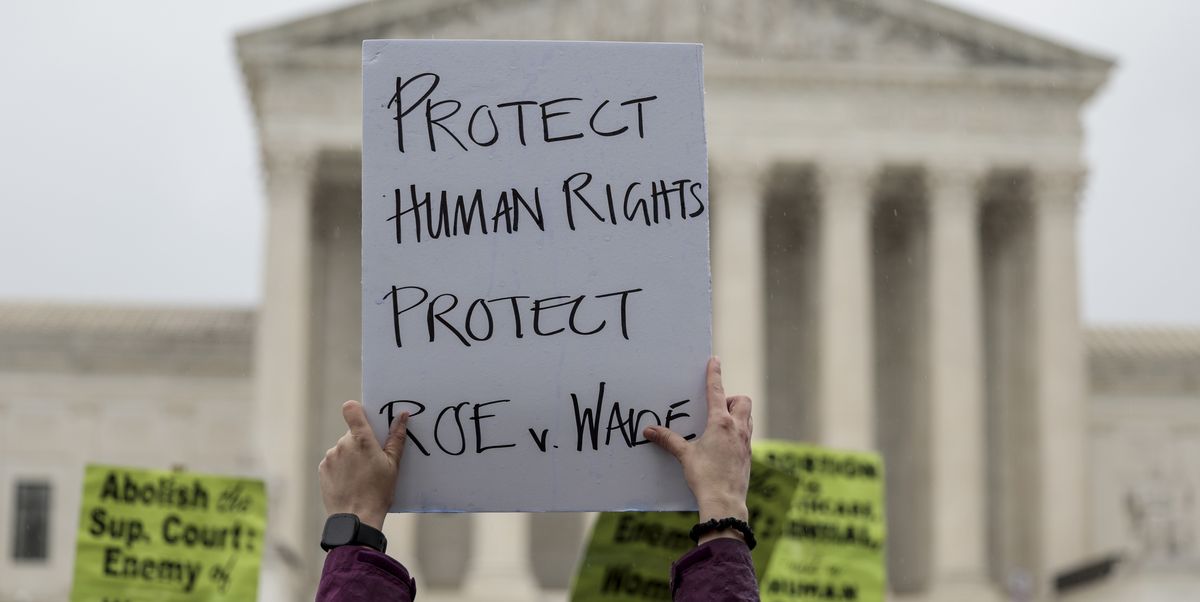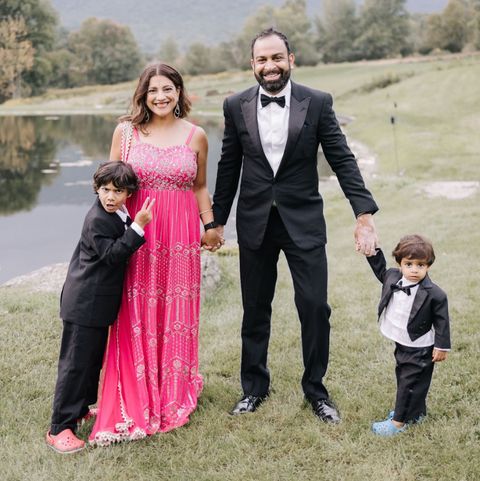
In America, we’re made to believe that the opposite of abortion is motherhood. We’re told that people who have abortions do so to avoid becoming mothers, and that people who are mothers clearly didn’t have abortions—our “minds blown” when we learn otherwise. We’re taught that if motherhood represents a kind of fundamental unselfishness, a self-sacrificing surrender in the name of the greater good, then abortion—a basic exercise in autonomy—is its antithesis.
And yet nothing has made me more pro-choice than becoming a mother.
 The author with her sons, Shaan, far left, and Sai, far right.
The author with her sons, Shaan, far left, and Sai, far right.
Courtesy of author
Bringing my son into the world was a grueling experience—and it was one I willingly chose to have. The infertility treatments left me feeling bloated and misshapen; the consecutive miscarriages and subsequent D&C procedures were painful enough—physically and emotionally—without the fear of facing legal retribution for my personal health care choices; and then there was the labor, which was just as arduous as everyone warned it would be, and the postpartum period, which was far more arduous than anyone warned it would be.
But birthing a child in America was nothing compared to raising a child in America.
In America, one of six countries in the world without paid family leave, we rip our bodies apart to bring life into the world and then return to work—still healing, bleeding, leaking—weeks later. In America, where childcare costs more than college tuition, we’re told to work paid jobs to afford childcare to continue working paid jobs, and then come home at night to an unpaid second shift. In America, where even without these indignities, raising a child is exhausting and stressful and lonely, we’re asked to grin and bear it, even when we’re dying inside—figuratively, but also, more than any other industrialized nation, literally.
I’m not arguing that people shouldn’t become mothers; indeed, 60 percent of those who have an abortion are mothers. I’m arguing that no person should have to bear the burden of parenting in America, period—and especially without consenting to it.
I’m hardly the first to make this argument or to point out the hypocrisy of lawmakers who claim to be “pro-life” but deny Americans every basic resource and right needed to live. But I’ve found the need to keep repeating myself—to keep screaming into the abyss on the off-chance that someone with the power to do something will hear me—that the opposite of abortion isn’t motherhood at all. It’s injustice.
Every time women inch closer to equality, those in control find a way to turn us against each other and minimize our collective power.
Of course, it’s no accident that we’re made to believe otherwise; every time women inch closer to equality, those in control find a way to turn us against each other and minimize our collective power. This particular false division, between moms and people who get abortions, is just one of the many tactics used to distract us all—moms, women, working people, people who need health care, whoever—from fighting for our shared interests.
It’s the same reason women are told to fix ourselves, to lean in, to fight imposter syndrome rather than fight for the paid leave, childcare, and structural protections we’d really need to thrive in the workplace. To make to-do-lists and color code our way into equity in the home, rather than demand the long-overdue compensation that would make our lives truly equitable.
It’s why we’re gaslit into believing that women’s issues—and especially reproductive rights—are fringe issues, despite the fact that when you look at the numbers, neither women nor our issues are on the fringes. It’s how politicians and people in power don’t lose our votes, or our dollars, or our support when they leave paid family leave on the cutting room floor or neglect to even mention the word abortion at all.
And it’s why, when we do respond—when we warn that the end of Roe is upon us or fight to preserve the crumbs of bodily autonomy we have left—we’re told we’re overreacting. Of course, this couldn’t be further from the truth: even with Roe in place, getting an abortion in America is often a nightmare. Today, nearly nine out of every 10 U.S. counties lack an abortion clinic, and the cost of the procedure itself can be prohibitive, to say nothing of the travel expenses, lost wages, and, for those three out of five moms with kids, the cost of childcare.
Even with Roe in place, getting an abortion in America is often a nightmare.
As a result, women remain under the thumb of a patriarchal system that relies on our labor and our bodies to serve as the social safety net America pretends it can’t afford, while pouring hundreds of billions into our defense budget instead. The idea of letting us control the terms of that labor is, to those in power, preposterous—a threat to the kind of society in which men can have it all, and women are expected to help them get there. And so they guard that control and that autonomy, making it harder for us at every turn—emotionally, physically, and logistically—to fight back.
Which brings us to where we are today, when we’re expected to sacrifice what little freedom we have left. Not, as they want you to think, for the sake of our children (born, unborn, or otherwise)—because if that were the case, they’d give them health care; safe, quality schools; or at a minimum, clean water—but for the sake of preserving women’s subservience.
It’s time we channel that sacrifice towards a more noble cause: helping more women have more choices over their lives and livelihoods.
That starts by reframing who we’re talking about when we talk about abortions: the millions of moms who had an abortion and then had children, or had children and then had an abortion; the low-income women and Black and brown women who abortion bans will hit hardest; and, of course, the transgender and non-binary people who’ve had abortions and are too often erased from the conversation. Because let’s be clear: many mothers haven’t given birth, and many people who have given birth don’t identify as mothers.
We must do everything we can to protect the right to an abortion—but also every other right wrapped up in reproductive justice. That means donating to abortion funds, and voting for pro-choice candidates willing to do what it takes to enshrine reproductive rights into law; pushing our companies to offer paid leave and affordable childcare, including for when employees need to seek abortion care; and ensuring access to birth control, mental health care, and postpartum care.
I was pro-choice long before I gave birth. But being a mom made me realize how many choices we already don’t get to make, how deeply intertwined these choices are, and how important it is that we come together to take them back.
This content is created and maintained by a third party, and imported onto this page to help users provide their email addresses. You may be able to find more information about this and similar content at piano.io
